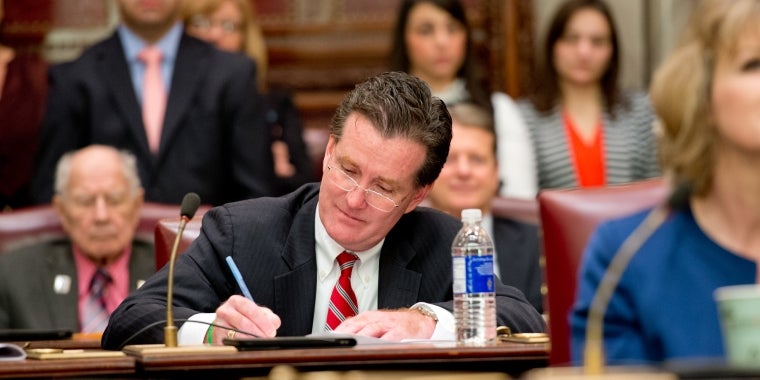
Senator Flanagan Announces Senate Passes Legislation Creating The Justice Center For The Protection of People with Special Needs
John J. Flanagan
June 21, 2012
-
ISSUE:
- Disability
Senator John Flanagan (2nd Senate District) recently voted for Senate passage of sweeping legislation that will transform how New Yorkers with special needs and disabilities are protected. The bill (S7749), which passed the Senate unanimously, is part of an agreement between the Senate, Assembly and Governor Andrew Cuomo to establish the strongest standards and practices in the nation for protecting individuals in state operated, certified or licensed facilities and programs.
“With all the stress that parents of special needs children face, it is important that they know that New York State is working to give them greater peace of mind when it involves the care of their children. More importantly, our most vulnerable citizens must be protected and their care closely monitored to ensure that they receive the highest quality assistance. This legislation will help accomplish both of these goals and I applaud all involved for working together to enact this important legislation this year,” stated Senator Flanagan.
The legislation strengthens and standardizes the safeguards for vulnerable children and adults who receive care from New York's human services agencies and programs. It creates a Justice Center for the Protection of People with Special Needs, a new entity that would cut across bureaucratic lines and have as its primary purpose and responsibility the protection of the health, safety and welfare of vulnerable persons.
The Center would improve the state's response to allegations of abuse and neglect for individuals served in both residential and non-residential facilities, by:
• operating a statewide 24-hour hotline staffed by trained personnel to which mandated reporters would be required to report reportable incidents committed against people with special needs who are being served by State and private residential and non-residential facilities and programs;
• ensuring that allegations of abuse and neglect are promptly, fully and effectively investigated, including ensuring that, where appropriate, these incidents are reported to law enforcement and the wrongdoers prosecuted;
• developing common standards and requirements for investigations and training of investigators;
• ensuring that individuals who are responsible for abuse and neglect of people with special needs are held accountable;
• prosecuting abuse and neglect crimes committed against people with special needs through concurrent authority with District Attorneys;
• requiring providers to implement corrective action plans to prevent future incidents of abuse and neglect;
• representing the State at all State employee disciplinary proceedings and at administrative proceedings related to substantiated allegations of abuse and neglect;
• requiring, where permitted by existing collective bargaining agreements, that individuals found responsible for serious or repeated acts of abuse or neglect be subject to termination, and imposing progressive discipline, including retraining, on employees responsible for less serious acts;
• developing a register that will contain the names of individuals found responsible for egregious or repeated acts of abuse or neglect, and barring such individuals from future employment in the care of people with special needs;
• conducting the criminal history background check function for any person applying to be an employee, volunteer or consultant for whom a criminal background check is required as a condition of employment at any facility or provider agency operated, licensed or certified by the Office of Mental Health, Office for People with Developmental Disabilities or Office of Children and Family Services;
• providing oversight of the human services system, conducting death and abuse investigations, and identifying risks and best practices to promote improved quality of care for people with special needs; and
• developing codes of conduct to which all workers who have regular contact with people with special needs must subscribe.
This measure also creates other protections for people with special needs by strengthening criminal statutes that make abuse of vulnerable or disabled persons a crime. It promotes transparency by requiring non-state operated and provider agencies to disclose the same records relating to abuse and neglect as State agencies are required to do under the Freedom of Information Law.
The bill was sent to the Assembly, where it also passed unanimously, and now will be sent to Governor Cuomo to be signed into law.



